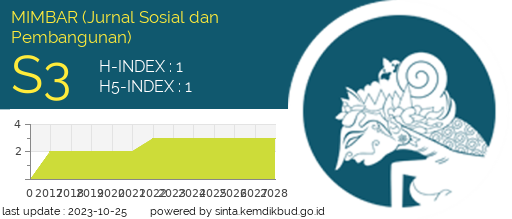Sustainable Business of Kopi Kenangan as a Startup Company in Improving the Company's Reputation and Competitiveness
DOI:
https://doi.org/10.29313/mimbar.vi.3927Keywords:
Sustainable Business, Corporate Sustainability, Investor RelationsAbstract
In today's business landscape, sustainability is paramount for long-term success and societal impact. Sustainable business practices provide myriad benefits, including cost savings, productivity enhancement, reputation improvement, and competitiveness. This research investigates the sustainable business model of Kopi Kenangan, a prominent Indonesian startup, and its impact on the company's reputation and competitiveness. Winston (2018) articulates the financial and strategic advantages of sustainability, highlighting cost savings, productivity, reputation enhancement, and global competitiveness. Unsustainable businesses, conversely, face increased operational, reputational, and regulatory risks. This research builds on these findings, examining the correlation between corporate sustainability and investor relations, as noted by Lenox & Meehan III (2014). Kopi Kenangan's journey to unicorn status exemplifies the integration of sustainable practices with business strategy. Achieving a valuation exceeding USD 1 billion, Kopi Kenangan's success underscores the significance of sustainability in attracting investment and fostering growth. Their approach includes responsible ingredient sourcing, eco-friendly packaging, and efforts to minimize environmental impact, reflecting a commitment to the Triple Bottom Line (TBL) framework of profit, people, and planet introduced by Elkington (1994). The qualitative analysis, supported by document studies and expert interviews, reveals that Kopi Kenangan's sustainable business model not only enhances financial performance but also builds strong investor relations and community trust. This research highlights the role of effective communication in fostering investor confidence and sustaining business growth. Kopi Kenangan's practices illustrate the broader benefits of sustainable business: preserving natural resources, reducing pollution, and improving community welfare. Their focus on employee well-being, local community development, and environmental stewardship sets a benchmark for startups aiming to balance profitability with social and environmental responsibility. This study concludes that sustainable business practices are essential for startups to enhance reputation, attract investment, and achieve long-term competitiveness. Kopi Kenangan's success serves as a compelling case for the strategic integration of sustainability in business operations, offering valuable insights for other startups in the F&B sector and beyond.
References
Aaker, D. A. (1991). Managing Brand Equity: Capitalizing on the Value of a Brand Name. Free Press.
Anggit, P. (2022). Travel Coffee Memories: The First Unicorn of the F&B Industry in Southeast Asia. KoinWorks. Retrieved from https://koinworks.com/blog/kopi-kenangan/
Bowen, G. A. (2009). Document analysis as a qualitative research method. Qualitative Research Journal, 9(2), 27-40. https://doi.org/10.3316/QRJ0902027
Chotidjah, N. (2023). Local Wisdom as a Form of Development Principles of Environmental Sustainability in Indonesia. MIMBAR: Jurnal Sosial dan Pembangunan, 27-34.
Dem. (2022, September 6). The latest startup investment data, Sinar Mas to Sandra Dewi. CNBC Indonesia. Retrieved from https://www.cnbcindonesia.com/tech/20220906075105-37-369557/data-investasi-startup-terbaru-sinar-mas-sampai-sandra-dewi
Edelman. (2020). Edelman Trust Barometer 2020. Edelman. Retrieved from https://www.edelman.com/trust/2020-trust-barometer
Forbes. (2020). World's Most Valuable Brands 2020. Forbes. Retrieved from https://www.forbes.com/the-worlds-most-valuable-brands/
Fortune. (2021). Fortune 500 List 2021. Fortune. Retrieved from https://fortune.com/fortune500/
Harvard Business Review. (2019). Patagonia’s CEO on the Company’s Fight to Save Public Lands. Harvard Business Review. Retrieved from https://hbr.org/2019/04/patagonias-ceo-on-the-companys-fight-to-save-public-lands
Hoffmann, C., & Fieseler, C. (2012). Investor relations beyond financials: Non‐financial factors and capital market image building. Corporate Communications: An International Journal.
Kopi Kenangan's sustainable F&B goals for 2030. (2023, May 19). Kopi Kenangan. https://kopikenangan.com/news/babak-baru-kenangan-brands-fokus-menjadi-perusahaan-fampbnbsp-berkelanjutan-di-tahun-2030
Lenox, M. J., & Meehan III, W. E. (2014). The Relationship Between Corporate Sustainability and Investor Relations. Journal of Business Ethics.
LinkedIn. (2019). Employer Brand Statistics. LinkedIn Talent Solutions. Retrieved from https://business.linkedin.com/talent-solutions/blog/employer-brand/2019/employer-brand-statistics
Nielsen. (2015). Consumer-Goods’ Brands That Demonstrate Commitment to Sustainability Outperform Those That Don’t. Nielsen. Retrieved from https://www.nielsen.com/us/en/insights/article/2015/consumer-goods-brands-that-demonstrate-commitment-to-sustainability-outperform/
Onyali, C. I. (2014). Triple bottom line accounting and sustainable corporate performance. Research Journal of Finance and Accounting, 5(8), 195-209.
Reuters. (2015). Volkswagen shares plunge after emissions scandal. Reuters. Retrieved from https://www.reuters.com/article/us-volkswagen-emissions-idUSKCN0RH12A20150921
Syawalia, R. (2022, September 6). Invest and Own a Profitable Business Starting at 1 Million in LandX. landx.id. Retrieved April 28, 2023, from https://landx.id/blog/investor-relations-tugas-peran-investor-relations-dalam-perusahaan/
Tamrin, M. H., & Lubis, L. (2023). Stakeholder Collaboration in The Development of Essential Ecosystem Area. MIMBAR: Jurnal Sosial Dan Pembangunan, 35-43. United Nations Environment Programme (UNEP). (2023). Sustainable business: A guide for action. Geneva: UNEP.
Wareza, M. (2021, December 29). Getting IDR 1.37 T, Kenangan coffee officially became a unicorn. CNBC Indonesia. Retrieved from https://www.cnbcindonesia.com/market/20211229093300-17-302874/dapat-duit-rp-137-t-kopi-kenangan-resmi-jadi-unicorn
Wilner, A. R., & Meehan III, W. E. (2015). The Impact of Corporate Sustainability on Reputation and Financial Performance. Business & Society.
Winston, A. (2018, August 7). Explaining the business case for sustainability Again . . . and again . . . and again. MIT Sloan Management Review. Retrieved from https://sloanreview.mit.edu/article/explaining-the-business-case-for-sustainability-again-and-again-and-again/
World Business Council for Sustainable Development (WBCSD). (2023). Sustainable business: The next frontier. Geneva: WBCSD.
World Economic Forum (WEF). (2023). The sustainable business revolution. Geneva: WEF.
Downloads
Published
Issue
Section
License
Copyright (c) 2024 Deddy Muharman

This work is licensed under a Creative Commons Attribution-NonCommercial-ShareAlike 4.0 International License.














